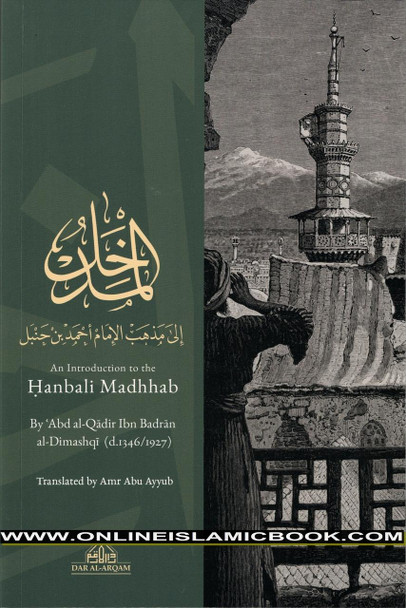Description
An Introduction to the Hanbali Madhhab (Without Arabic Text) By Abd al-Qadir Ibn Badran al-Dimashqi
ISBN:9781838489700
Author: Abd al-Qadir Ibn Badran al-Dimashqi
Book Binding:Soft cover
Pages 548
Size: 9.5 x 6.3 x 1.6 inch
Publication year:2021
Description
About This Book:
Ibn Taymiyyah said about al-Imam Ahmad, “He was the virtuous imam, and the complete leader with whom Allah clarified the truth, rejected falsehoods, clarified the correct methodology and repudiated the innovations of innovators, the heresies of heretics, and the doubts of the doubtful.” [Bayan Talbis al-Jahmiyyah (3/312)] Al-Subki said, “He was the virtuous imam and the leader of a way of thought. He was patient during the midst of his inquisition. He was the teacher and exemplar of Ahl al-Sunnah.” [Tabagāt al-Shafi’iyyah al-Kubra (2/27)] Al-Shafi’i said of him, “Aḥmad is an imam in eight characteristics: He is an imam in ḥadīth, an imam in jurisprudence, an imam in language, an imam in Qur’an, an imam in poverty, an imam in asceticism, an imam in abstinence, and an imam in Sunnah.” [Tabagāt al-Ḥanabilah of Ibn Abi Ya’la (1/5)] Al-Ustadh Ad-ham al-Junaydi stated, “Ibn Badran was skilled in all rational, literary, and mathematical sciences. He was encyclopedic in his knowledge of law and grammar. He was truly an authority. He was a virtuous shaykh, forsaking the vanities of this world, austere in his dress, home, and life.” [Alam al-Adab wa ‘l-Fan (1/224-225)] Al-Shaykh Muhammad Bahjat al-Bayṭār said, “He had high aspirations and many efforts in reviving the religious and scholarly awakening in the Levant. He resembled the scholars of the Salaf in that he taught in private, preached in public, authored books, and forsook the vanities of the worldly life.” [In the introduction of Munadamat al-Atlal]

















